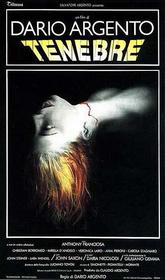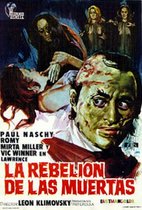Our editor-in-chief Nate Yapp is proud to have contributed to the new book Hidden Horror: A Celebration of 101 Underrated and Overlooked Fright Flicks, edited by Aaron Christensen. Another contributors include Anthony Timpone, B.J. Colangelo, Dave Alexander, Classic-Horror.com's own Robert C. Ring and John W. Bowen. Pick up a copy today from Amazon.com!
Tenebre (1982)
Varying from pleasant exercises in gore and creepy thrills to sustained boredom and ridiculously bad filmmaking, Dario Argento's Tenebre sprawls like shiftless drunk passing out on a nice couch.
Anthony Franciosa plays Peter Neal, a popular mystery/thriller author who is headed to Rome for a promotional tour and to cement foreign publishing deals. "Tenebre" is the name of his latest book -- a potboiler that features a psycho slasher and a plot full of action that that some dismiss as sexist and formulaic. Before he makes it to Rome, though -- while still at the airport in New York, in fact, we see someone either steal and/or sabotage his carry-on bag in some way. And soon after he arrives in Italy, he becomes hounded by detectives, as it seems there is a copycat killer in Rome who is emulating the plot of "Tenebre," the book.
It certainly isn't a bad plot, but it doesn't take long before the delivery starts to come across like a pretty cheesy made-for-tv film rather than an artful, suspenseful theatrical release. I began watching Tenebre with my roommate, but it only took about twenty minutes before she gave up on it as too boring to waste time on and headed off to watch some paint dry or something.
Although hints remain, Tenebre contains little of the visual superiority evidenced by Argento in films such as Suspiria. Among the hints are a gloved hand using a razor blade to cut a light bulb like butter, the same hand rinsing blood off the same blade after a fresh kill, and some of the nice, flowing, and artfully over-deliberate choreographed edits that Argento uses to convey simple actions.
But Argento's disregard for internal logic/consistency isn't as easy to overlook here as in some of his other films. Many of the hints of visual acuity are negated by their arbitrariness. And at their worst -- as in the infamous tracking shot that roams over a home for 5 minutes or so -- Argento's visuals disrupt the movie so drastically that they move beyond unintentional self-parody and become tortuously difficult to watch without deciding to just chuck the video cassette out the window and vow to never again rent before buying.
Since Tenebre is a horror film, some of you might be thinking that "tortuously difficult to watch" refers, in some way, to horror content. I just want to stress that these arbitrary visuals are difficult to watch simply because they are so badly incorporated. Speaking of watching paint dry, they have the same effect that a 5-minute scene of paint drying would have in, say, The Godfather.
The lapses in logic occur less abstractly, also. There are a number of unintentionally funny oversights in the script, and if you try to work out the implications of the twist in the climax of the film, you're likely to utter something along the lines of, "There are some movies that you just shouldn't think about too much" or try to excuse the problems as being merely examples of postmodernist muscle flexing, or maybe just get a headache.
Most of the cast doesn't help, either. Peter Neal's assistant should have received an award for terrible acting. John Saxon demonstrates why he has a reputation for performing in movies that, no matter how guilty you feel for saying movies with Saxon in the cast suck, or how much they tend to have an odd quality that makes you really want to like them (as Tenebre does), can only be described by some combination of words like "bad horror cheese." The rest of the cast basically functions as less-than-fascinating props.
On the other hand, Argento knows how to pick actresses that make you not want to miss a frame--in my opinion, every woman in this film was gorgeous. Well, at least with the possible exception of a housekeeper who shows up at the police station.
And that's not the only pleasant aspect. Like usual, Argento deals out spectacular death scenes, and even though the effects are a bit under par technically, there are lots of great death scenes in Tenebre. And the last 15 minutes are worthy of at least a better film. In that closing section, suspense is effectively created, there are a couple twists that create intense dramatic interest, and there's gore galore.
Also interesting is Argento's ability to create creepy suspense without resorting to the stereotypical gimmicks. The place where this is most evidenced in Tenebre is during the extended scene leading up to the first death -- it's broad daylight, there is no "jump music," etc. but we're lead into a tense, creepy, thrilling situation with a nice payoff.
And speaking of music, whereas something like Suspiria incorporates beautiful, odd music for a horror film, Tenebre incorporates a score that more often than not sounds like badly dated, early 80s disco. The score rarely helps the film here, and is usually just irritating--at its worst, embarrassing.
Of course Tenebre is recommended viewing for Argento and Italian horror fans, as well as scholars of the genre in general. If you're a gore fan, you should check it out for that aspect as well, although you'd surely be excused for fast forwarding through what you'd see as the boring parts. If you don't mind plots that bypass logic and occasionally move slower than molasses, you might want to check out Tenebre for the few examples of Argento's artistry peeking through--especially in the end.









I couldn't feel more
I couldn't feel more differently about the soundtrack, which I paid a hefty sum for back in the '90s on vinyl and listen to at least once a month. As for the plot of Tenebre, of course it's the weakest link -- all of Argento's films suffer in this department. The film is a feast for the senses, full of shocks and breathtaking cinematography, that will appeal to Argento fans and those patient viewers who appreciate the rewards of very European horror.